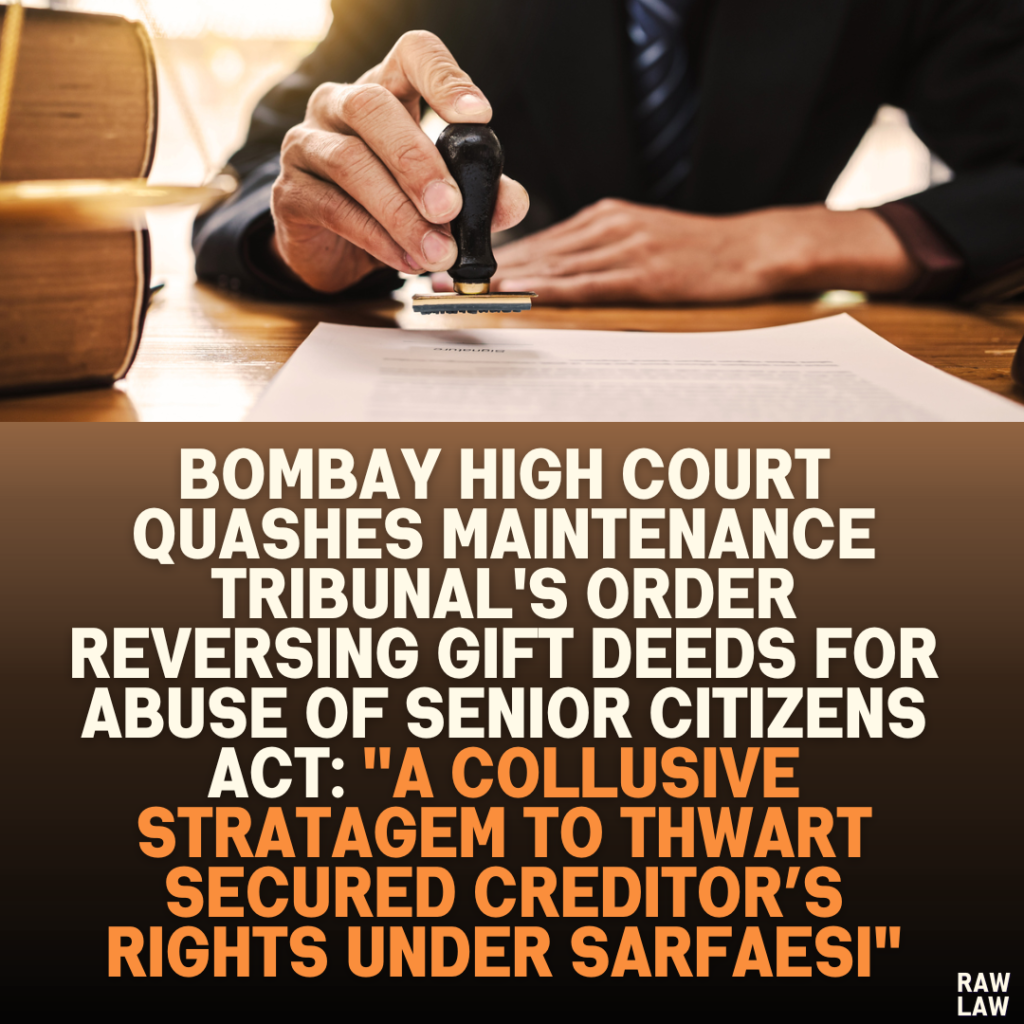Court’s Decision
The Bombay High Court overturned the Maintenance Tribunal’s order that reversed two gift deeds executed by a senior citizen, Bharati, in favor of her son and daughter-in-law. The court observed that:
- The proceedings were collusive, intended to undermine the rights of SBI as a secured creditor.
- The Maintenance Tribunal acted without examining jurisdictional facts and failed to adhere to the requirements of Section 23 of the Senior Citizens Act.
- The misuse of the Act necessitated judicial intervention to uphold the rule of law.
The court imposed costs of ₹1 lakh on Bharati, directing her to donate it to Helpage India as a measure of accountability.
Facts
- Background of the Gift Deeds:
- In 2009, Bharati transferred property to her son, Tejas, through a gift deed.
- In 2017, another property was transferred to her daughter-in-law, Vidhi, via a second gift deed.
- Loan and Mortgage:
- The properties were mortgaged to SBI as security for loans availed by a family-run business, Manav Greys Exim Pvt. Ltd., promoted by Tejas and Vidhi.
- The business defaulted, and SBI initiated recovery proceedings under the SARFAESI Act.
- Application Under Senior Citizens Act:
- Bharati filed an application with the Maintenance Tribunal, alleging that the properties were gifted on the condition that Tejas and Vidhi would maintain her, but they had failed to do so.
- The Tribunal reversed the transfers, citing neglect by Tejas and Vidhi.
- SBI’s Challenge:
- SBI challenged this order, asserting it was a collusive effort to thwart its recovery rights over the mortgaged properties.
Issues
- Legality of the Tribunal’s Order:
- Did the Tribunal have jurisdiction under Section 23 of the Senior Citizens Act to reverse the transfers?
- Evaluation of Conditions:
- Were the conditions of maintenance and neglect, as required under Section 23, established before the reversal?
- Impact on Third-Party Rights:
- Could the Maintenance Tribunal disregard the mortgages created on the properties in favor of SBI?
Petitioner’s Arguments
- Collusive Proceedings:
- SBI argued that Bharati’s application was a sham to nullify the mortgages and frustrate its recovery proceedings.
- No Jurisdictional Basis:
- The conditions required under Section 23, including proof of neglect and a promise to maintain, were neither pleaded nor proven.
- Violation of Third-Party Rights:
- The Maintenance Tribunal failed to consider that the properties were already encumbered with SBI’s mortgage, registered with the Central Registry of Securitisation Asset Reconstruction and Security Interest of India (CERSAI).
Respondent’s Arguments
- Conditional Transfers:
- Bharati’s counsel claimed that the transfers were contingent upon Tejas and Vidhi maintaining her.
- The Tribunal was correct in reversing the transfers upon proof of neglect.
- Alternate Remedies:
- It was argued that SBI should have pursued an appellate remedy under the Senior Citizens Act rather than invoking writ jurisdiction.
Analysis of the Law
- Section 23 of the Senior Citizens Act:
- This section empowers the Maintenance Tribunal to declare a transfer of property void if:
- The transfer was made by a senior citizen subject to the condition of maintenance.
- The transferee refused or failed to fulfill that condition.
- The court emphasized that proof of these jurisdictional facts is essential for the exercise of this power.
- This section empowers the Maintenance Tribunal to declare a transfer of property void if:
- Failure of Jurisdictional Scrutiny:
- The court found that the Tribunal failed to establish:
- Whether the gift deeds included an explicit or implicit condition of maintenance.
- Whether Bharati was a “senior citizen” at the time of the transfers (she was below 60 during the first transfer in 2009).
- Whether Tejas and Vidhi were indeed neglectful or unable to maintain Bharati.
- The court found that the Tribunal failed to establish:
- Supreme Court Precedents:
- The court referred to Sudesh Chhikara v. Ramti Devi, where the Supreme Court stressed that the existence of conditions under Section 23 must be established before reversing property transfers.
Precedent Analysis
- Sudesh Chhikara v. Ramti Devi & Anr.:
- The Supreme Court ruled that a tribunal must confirm the existence of specific conditions for maintenance before voiding property transfers.
- S.P. Chengalvaraya Naidu v. Jagannath:
- Highlighted the judiciary’s responsibility to prevent abuse of process and ensure that only genuine claims are entertained.
Court’s Reasoning
- Collusion and Abuse:
- The application and proceedings before the Tribunal were a stratagem devised to frustrate SBI’s recovery efforts.
- The dramatic application filed by Bharati was met with a tacit, collusive reply from Tejas and Vidhi, admitting non-performance of alleged obligations.
- Failure to Establish Conditions:
- The absence of any explicit condition in the gift deeds undermined the claim of conditional transfers.
- The court questioned the credibility of letters purportedly written by Tejas and Vidhi, promising maintenance, noting inconsistencies and suspicious timing.
- Impact on Third Parties:
- The Tribunal ignored the significant fact that the properties were already mortgaged, disregarding the rights of SBI as a secured creditor.
Conclusion
The High Court quashed the Maintenance Tribunal’s order, observing:
- The Tribunal’s proceedings were arbitrary, devoid of scrutiny, and failed to address essential jurisdictional facts.
- The collusion between Bharati, Tejas, and Vidhi was evident, aimed at defeating SBI’s rights as a secured creditor.
The court ordered costs of ₹1 lakh to be donated to Helpage India and emphasized the need to protect welfare legislation from misuse.
Implications
- The judgment serves as a warning against the misuse of welfare laws for personal or collusive gains.
- It reinforces the principle that judicial forums must exercise caution and diligence in cases involving property rights and welfare legislation.
- It underscores the judiciary’s role in safeguarding the integrity of secured transactions and ensuring that welfare measures are not exploited to defeat commercial rights.
